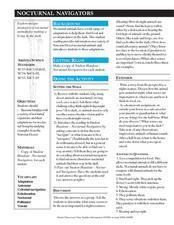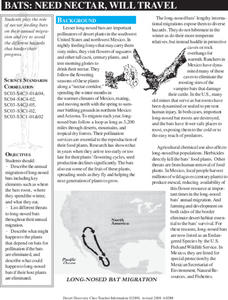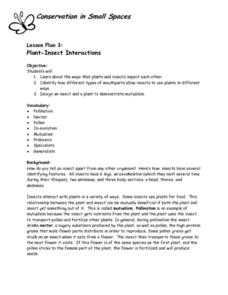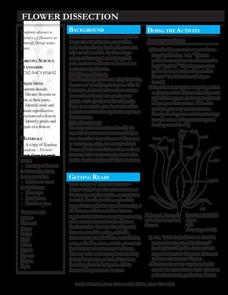Curated OER
Communication in Bees
Eighth graders identify and interpret a scientific investigation and a hypothesis through experimentation and testing a hypothesis. They identify what scientists hypothesized about the communication of stingless bees. Finally, 8th...
Curated OER
Little Bloomers: Gardening With Trees
Learners identify the parts of tree flowers. They examine the role they have in pollination. They discuss trees that do not flower as well.
Curated OER
Life cycles
Students identify and explain the parts of a flower and their role in the life cycle of flowering plants, including pollination, seed dispersal, and germination. Students recap the following information: that plants need light, warmth,...
Curated OER
The Plant Bartering System
Fifth graders explore plant characteristics by viewing a flower and seed presentation. In this environmental adaptation lesson, 5th graders identify specific traits plants have in order to allow them to grow in different climates whether...
Curated OER
Genetics and the Work of Mendel
Excellent examples and clear diagrams in this PowerPoint will help you explain the genetics of alleles and the combinations of hybrid crosses. A high school class would appreciate having this student copy of the PowerPoint as the images...
Desert Discoveries
Nocturnal Navigators
Young biologists take a look at some of the unique ways that nocturnal animals survive in the dark. After reading a terrific student handout which is embedded in the plan, learners work together to answer questions about what they have...
Curated OER
Bats: Need Nectar, Will Travel
Beginning wildlife biologists become adult bats, baby bats, snakes, owls, bobcats, or land-clearing developers in a grand role-playing activity. In a large open space, they play a game in which they move to designated areas based on what...
Curated OER
Conservation in Small Spaces: Plant-Insect Interactions
Students explore ways that plants and insects impact each other, identify how different types of mouthparts allow insects to use plants in different ways, and design an insect and a plant to demonstrate mutualism.
Curated OER
Mendelian Genetics
Although these slides seem full of text, the information is bulleted and clear. There is a list of vocabulary and then two slides to define examples of Mendelian inheritance and rules of probability. The remaining five slides look...
Curated OER
Genetics and The Work of Mendel
If you need a summary of all aspects of Mendelian genetics then this slideshow is for you. The information included is essential for complete understanding of crosses, genotypes, phenotypes, and heredity.
Curated OER
Pumpkin Time
Students visit a pumpkin farm and discuss the characteristics of a pumpkin and how they grow. They create a class story about the trip to the farm with each student supplying a sequence for the story.
Curated OER
Flower Dissection
Beginning biologists pull a flower apart and familiarize themselves with the different reproductive structures. Why have them learn only from just a book or diagram when they can examine real samples? There is no link to the referenced...
Curated OER
Rainforest Complexity and Diversity
Second graders investigate the diversity of plants and animals in a rainforest. They watch an online story developed by the Rainforest Alliance, observe and record animals in their local area, explore various websites, and compare and...
Curated OER
Placing Artificial Domiciles to Attract Bumble Bees
Students investigate how to entice bumble bees to accept artificial domiciles. They conduct research about bee biology and nest architecture, plan and construct an artificial domicile to attract bumble bee queens, and monitor and record...
Agriculture in the Classroom
Pumpkins... Not Just For Halloween
Celebrate fall with four pumpkin themed hands-on activities! After learning about pumpkins, scholars complete two activity sheets that reinforce estimation and word problems. They then plant pumpkin seeds and bake a pie in...
Curated OER
Earth's Heavenly Treasures: Hummingbirds
Young ornithologists watch an informative video and use the Internet to gather data about the life, size, habitat, and migration of hummingbirds. The interdisciplinary lesson includes activities that target art, science, math, and...
Curated OER
Bursting Blooms- Create an Early Spring
Students prune a tree. In this gardening lesson, students select a shrub or tree that has a lot of flower buds and use sharp pruners to cut sections of branches. Students place the cuttings into cool water and move into a...
Curated OER
Fall 2003 Midterm Exam #3
Let there be light! When your physics learners take this midterm exam, light will be their focus. They will show what they know about electromagnetic waves, interference, refraction, reflection, lenses, prisms, and more! The test is...
Curated OER
Genetics Practice 1: Basic Mendelian Genetics
Six genetics problems are to be solved by junior geneticists. Empty Punnett squares are provided for them to plant the parents' alleles and determine the genotype, phenotype, and frequency of offspring. All of the problems involve actual...
Curated OER
Symbiotic Relationships
Offering a comprehensive overview of symbiotic relationships, this presentation would be a great way to introduce or review material covered in a biology class. There are definitions, examples, and a quiz on the meaning of parasitism,...
Primary Resources
Science - The Parts of a Flower
Here is what a PowerPoint presentation should look like! This excellent show lets students know what they will be learning about, takes them through nicely-designed examples, leaves room for discussion questions, has a built-in activity,...
Curated OER
Beneficial Bug Scavenger Hunt
Going on a scavenger hunt sounds like a great way to spice up any lesson plan. To better understand how beneficial insects are, the class goes outdoors to search for and observe a bug that has big benefits. Included in the lesson are...
National Wildlife Federation
Habitat Web
Young scientists weave together an understanding of ecosystems with this fun collaborative activity. Taking on the roles of different living and non-living elements of specific habitats, learners use a ball of yarn to create...
Kentucky School for the Deaf
Levels of Organization within an Ecosystem
From tiny organisms to entire biomes, young scientists examine the interdependent relationships tying all living and non-living things together with this collection of ecology resources.
Other popular searches
- Bees Pollination
- Flower Parts and Pollination
- Pollination Flow Chart
- Cross Pollination
- 6 Steps of Pollination
- Pollination Activities
- Pollination Flowchart
- Pollination Process
- Pollination and Fertilization
- Plants Pollination
- Cross Pollination
- Plants Cross Pollination

























